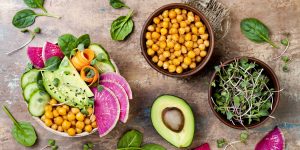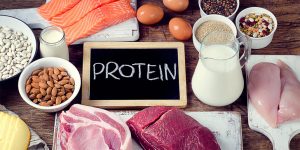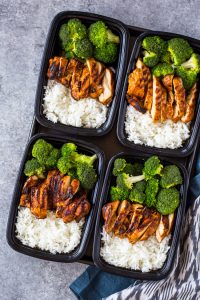
QUESTIONS
By: Dr. Keith Kantor
- Well, IS it possible to build muscle and lose fat on a vegan diet? Yes, it is possible, but the person has to be disciplined in tracking their macronutrients to ensure they are getting in enough protein, healthy fats, etc. Due to the breakdown of muscle during intense and heavy lifting strength training sessions a protein supplement may be needed in addition to regular meals. The best all vegetarian protein supplement I found is Superfood by Natratech.com. It is all natural and packed with all natural vegetable based vitamins/minerals, antioxidants, health fats and protein.

- Is it dependent on macronutrients? Is there a macronutrient breakdown
that you recommend for vegan bodybuilding? Vegan bodybuilding will have more success if macronutrients are balanced, as at least 25-30% protein, 40-45% carbohydrates and 30-35% healthy fats. Always opt for higher fiber carbohydrate options(vegetables) to avoid a spike and drop in insulin levels, if insulin is not balanced then it is hard to drop body fat.
- Research has shown that eating enough protein is important for building
muscle. I’d love to hear what some of the vegan protein sources
you recommend are. How do you ensure that you’re getting all of
the amino acids? Aside from a high quality super-food meal replacement shake actual vegan foods sources for protein include Tofu, tempeh and edamame, look for non- GMO options, which are the best for hormone levels and fat loss. Nuts, and seeds are also a great protein source but they are primarily a heart healthy fat and it is difficult to get all of the protein you need from nuts and seeds. Lentils and beans are also a great source of protein but the portions should be moderate due to the higher carbohydrate content of these foods. Amino acids are found in vegan foods in very small amounts, most vegans tend to be deficient in methionine and lysine. To ensure you are getting all of your amino acids I would supplement with servings of branched chain amino acids daily.

- Are there any micronutrient deficiencies that vegan bodybuilders need to worry or be aware of? What supplements or foods do you recommend folks eat in order to best avoid these? In addition to the amino acids methionine and lysine mentioned above vegans can also be deficient in Vitamin B-12, vitamin D, Omega3 fatty acids, zinc and iron. Spending 15 minutes per day in the sun can help boost vitamin D levels naturally; supplements of zinc, iron, and a high quality multi-vitamin/mineral can help reduce risk of deficiencies. Consuming flax seed, raw nuts and seeds can help boost omega 3 fatty acid levels. If you have the Super-food shake mentioned above you should avoid deficiencies.
- Any breakfast meal recommendations? /Examples? A simple protein shake with unsweet coconut milk, flax seed, berries, spinach, and 1 scoop of protein powder (Super-food would work well in this case).
- How about lunch/dinner/snacks/
Snacks- handful of nuts and seeds, raw nut butter with sliced apples, fresh guacamole with chopped vegetables.
Lunch/Dinner – grilled tempeh salad, stir-fry tofu, roasted vegetables with bean salad
- Anything else you’d like to say on this topic?
To build substantial muscle as a vegan is not impossible but it takes far more dedication and determination to creatively meet macro and micro nutrient targets daily.
PART II
Bodybuilding Meal Prep Summary: Can we outline what
bodybuilding meal prep usually looks like (is it based on
macros, etc.?) and provide a few easy meal combos and best
practices?
QUESTIONS
- Is it based on calories? Macros? Nutrient-timing? Macronutrient tracking is my preferred tracking method simply because macronutrients have the most influence over your hormone levels. When hormone levels are balanced and within optimal ranges the body will be able to burn fat and maintain healthy weight more easily.
- How do you figure out how much protein you need in body-building? How about carbs and fat? Body builders need more protein then the average person due to the demand they put on their muscles and the constant tissue repair needed from intense lifting sessions. That being said protein can be overdone and it will strain your kidneys and if your body has too much protein, it can also process the protein differently resulting in a reduced ability to burn fat.
- Any tips that you have on meal prepping to make it easier?
If time is an issue give yourself the grace to buy pre washed and chopped vegetables, individual portioned items like hummus or guacamole, almond butter packets, etc. to save time. Grill or roast your proteins and portion out your vegetables, and make dressings, etc. ahead of time.

- Any easy meal combo examples? Best practices?
A simple tip I have given clients is to buy a party sized salad platter and portion it out in individual containers with protein options for the week. This is less time consuming then buying the individual items. In the winter months I recommend cooking a large pot of stew with whole unprocessed ingredients, if you don’t want to burn yourself out by eating the same stew all week freeze a bag of it and you can eat weeks later.
Lastly, shakes are a great way to sneak in vegetables, protein, etc. But you will be less likely to make a shake with several ingredients if you are in a time crunch. Pre-bag quart sized bags with a scoop of protein, BCAA’s, spinach, berries, avocado, or flax seed and freeze them. When you are ready to have your shake dump it in the blender with some unsweetened almond or coconut milk and off you go.
- Any breakfasts/lunches/dinner recipes you’d like to highlight?
Keep it simple and build your meals around protein, fibrous vegetables and healthy fats. Using fresh lemon or lime juice, herbs, spices, vinegars, etc. to enhance the flavor without increasing the sugar, or sodium intake. I enjoy a simple piece of wild caught salmon, baked sweet potato and sautéed kale.

